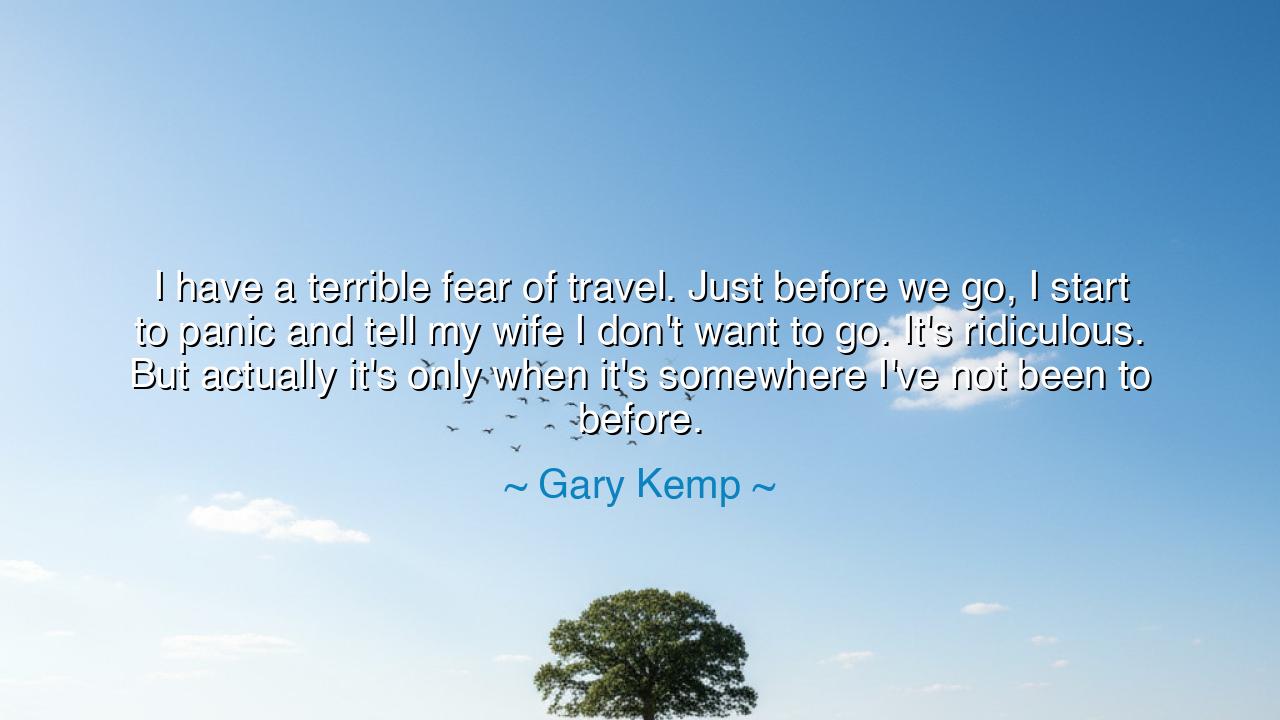
I have a terrible fear of travel. Just before we go, I start to
I have a terrible fear of travel. Just before we go, I start to panic and tell my wife I don't want to go. It's ridiculous. But actually it's only when it's somewhere I've not been to before.






Hear the honest confession of Gary Kemp, musician and wanderer of the human heart, who declared: “I have a terrible fear of travel. Just before we go, I start to panic and tell my wife I don’t want to go. It’s ridiculous. But actually it’s only when it’s somewhere I’ve not been to before.” In these words is a truth both intimate and universal: that the unknown, though it beckons with possibility, often terrifies the soul. We long for discovery, yet tremble before the unfamiliar. We yearn to step forward, yet cling to the comfort of the paths we already know.
This fear of travel is not merely about journeys across seas or lands; it is the symbol of all change, all growth, all movement into new territory. The heart is quick to resist what it has not yet mastered. The mind invents dangers where none may exist. And yet, once the step is taken, once the road is embraced, the fear dissolves into memory, and the traveler wonders why he hesitated at all. Thus Kemp’s words reveal the paradox of courage: that it is needed most not when we are in danger, but when we stand before the doorway of the unknown.
The ancients spoke of this fear. Recall the story of the Israelites, who, freed from slavery in Egypt, stood at the edge of the Promised Land. Though the land was rich, they were overcome with dread of what lay ahead. They said it was better to return to Egypt, to the known chains of bondage, than to risk the unknown freedom of new lands. Their terror was not of travel itself, but of the unfamiliar. And so too does Kemp’s panic mirror this eternal struggle: the fear not of the journey, but of what lies beyond the threshold of the familiar.
History, too, offers lessons. Consider Christopher Columbus, who stood at the harbor preparing to sail west into seas unmapped by his people. His sailors trembled, panicked, and begged him to turn back. They feared sea monsters, endless horizons, and falling off the edge of the earth. Yet by setting sail despite terror, they discovered new lands. Their story, like Kemp’s words, teaches that fear before the unknown is universal—but it is also the gatekeeper of discovery.
The emotional power of Kemp’s confession lies in its humility. He names his panic “ridiculous,” yet it is in truth deeply human. How many of us, before a new job, a new friendship, a new venture, have whispered the same resistance? “I don’t want to go. I don’t want to begin.” And yet, beyond that trembling moment lies growth, experience, even joy. Fear is not a sign to stop—it is a sign that we are about to step into something greater than ourselves.
The lesson, then, is radiant: do not let the fear of the unfamiliar bind you. Recognize that fear will always rise before you embark on a new road, but do not mistake its voice for wisdom. Fear is a shadow, not a truth. The path itself, once taken, dissolves the shadow and reveals the light. The traveler must learn to endure the trembling moment before departure, to walk through it, and to trust that beyond the first step lies discovery.
Practical wisdom follows: when fear rises before a journey—whether of travel, of change, or of growth—pause, breathe, and acknowledge it. Speak to yourself gently, as Kemp’s wife may speak to him: “This fear is natural, but it is not final.” Prepare well, but do not linger too long at the threshold. Step forward, even if your heart shakes, for only by stepping will you find that fear was nothing but mist before the dawn.
So let Gary Kemp’s words be remembered not as a confession of weakness, but as a mirror of humanity: “I have a terrible fear of travel… but only when it’s somewhere I’ve not been before.” In truth, every soul is a traveler, and every new step brings the tremor of the unknown. Yet the wise know this: fear is the herald of growth. When it rises, it means you are about to expand beyond the borders of the familiar. Walk forward, then, with courage—and you will find that what once seemed terrifying becomes, in time, the source of your most cherished memories.






AAdministratorAdministrator
Welcome, honored guests. Please leave a comment, we will respond soon